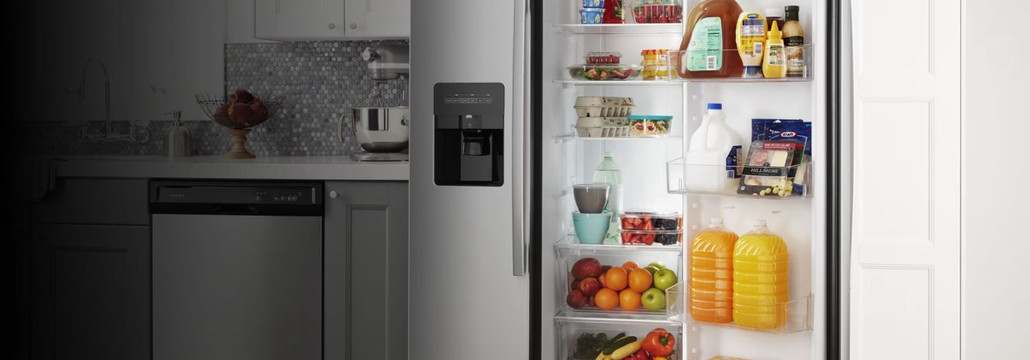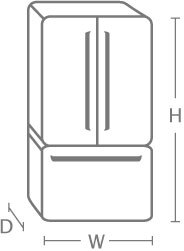
Refrigerators 101
2025 May 7th
1. Measure Your Space

REFRIGERATOR
Measure the height, width and depth of your new refrigerator.
W: side to side
Add 3 3/4″ minimum space to the hinged side and 1/2″ to the non-hinged side for door clearance and airflow. Remember side-by-side refrigerators have hinges on both sides, so you will need to allow 3 3/4″ on each side.
D: back to front
Add 1/2″ to back. Allow extra space at back for water lines if model has an icemaker or water dispenser.
H: top to bottom
Add 1/2″ to top.
CUTOUT SPACE
Measure the height, width and depth of the refrigerator cutout space in your kitchen.
ENTRANCE & DOORWAYS
Measure the size of the doorways, hallways and other points of entry you’ll need to pass through when you bring in your new refrigerator.
2. Decide What Type

Bottom-Freezer
Benefits: This configuration allows for easy storage of bulky or wide items.
Access: Fresh food is at eye level – a great option if fresh items are used more frequently, and stooping to reach products is difficult.
Size: Capacities range from 18.5 – 25 cu. ft.

Top-Freezer
Benefits: This traditional refrigerator type is a great value, and is available with unique features such as flexible beverage dispensers.
Access: Frozen food is at eye level – a great option if frozen items are purchased more frequently.
Size: Capacities range from 14.4 – 22 cu. ft.

Side-By-Side
Benefits: Vertical storage space creates a wide range of freezer capacity options.
Access: The narrower doors make food items easier to access in tight kitchen spaces.
Size: Capacities average approximately 25 cu. ft.
3. Additional Considerations
Evaluate the Features
Ice/Water Dispensers
Ice and water dispensers provide cool, fresh water and ice whenever you need it.
Water Filters
Keep your water fresh and sparkly with a new water filter designed for your fridge.
Upgraded Sound Insulation
Keep your refrigerator running quiet with more sound insulation that dampens buzzing, rattling and other noises.
Stainless Steel
Get a premium look that lasts with a stainless steel finish.
Smudge-Free Finishes (Universal Silver)
Keep your refrigerator looking clean.
Choose Your Accessories
Water Filters
Keep your water fresh by changing your refrigerator’s water filter every six months.
Cleaners & Deodorizers
Find a range of cleaning products made especially for your appliance.
Important Considerations
Energy Efficiency
Your refrigerator is one of the few appliances in your home that runs all day, but the cost of use is a factor that many people forget to consider. An older or inefficient refrigerator uses more energy, meaning a new refrigerator can actually save you money.
Aging refrigerators work harder – and cost more – to operate as refrigerants and seals degrade over time. [Source: http://energystar.gov] Units made before 1999 may not meet current Department of Energy usage guidelines. Some bottom-freezer refrigerators consume less energy than a 60-watt bulb.
